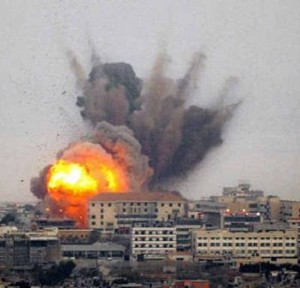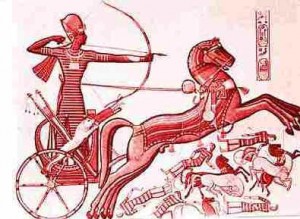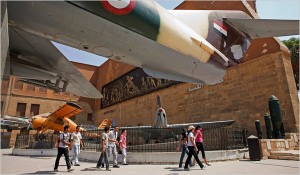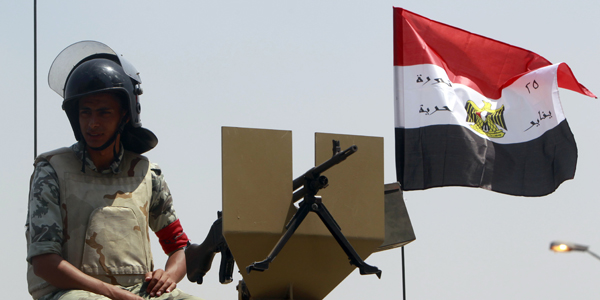Inside Egypt’s Military Mind
CAIRO, Egypt — Retired Egyptian Army General Hosam Sowilam knows how to control a conversation. With a jocular smile and a booming voice, he’ll hold and repeat a phrase — “Chaos! Chaos! Chaos!” — until he’s drowned out the question he doesn’t care to answer, dispelling even the shadow of doubt as he regains the floor.
“What happened on January 25?” Sowilam bellowed by way of introducing his history of the uprising in Tahrir Square. “Many of our youths went to Serbia and the United States of America, where they received training in how to overthrow the regime. They received training from Freedom House, and funding from the Jewish millionaire Soros.”
He goes on to weave a detailed story of a foreign plot against Egypt, in which unscrupulous agents from America, Israel, Saudi Arabia, and Qatar, backed by a web of corporate interests, took advantage of Egyptians legitimately dissatisfied about Hosni Mubarak’s plan to transfer power to his son.
“Look!” he says, pointing in a bond dossier at a page of logos from companies like Edelman and CBS. “All these corporations were behind the Arab spring. This is very dangerous.” There are headlines about Soros from websites like truthistreason.net and AnarchitexT.org (“I don’t know any thing about them,” Sowilam says. “I found them on the internet.”) Other data comes from better-known sources like The Washington Post and Wikileaks. He has carefully translated key points into Arabic to share with Egyptian reporters.
Although Sowilam holds no official role in the army that governs Egypt today, he considers that army his life, and relishes any chance to speak for its values and mindset, if not its official policies. He remains close to senior officers, and had a second career after the military at a defense think tank and now as an unofficial spokesman for the military. (I first met him a year ago while reporting a story about the military’s view on then-President Mubarak’s succession plans; Sowilam adamantly criticized the notion of hereditary power, but also warned that the military never would permit Islamists to rule Egypt.)
Bald and squat, with a body shaped like a calzone, Sowilam has the typical build of an artilleryman. An early career surrounded by the thud of big guns marred his hearing, which is why he often shouts in casual conversation. Born in 1937, Sowilam came of age and attended the military academy in the 1950s, in the halcyon era of Gamal Abdel Nasser’s Free Officers revolt. He took his commission when the army was at the zenith of its power, boldly refashioning Egypt’s political and economic order. He fought in the humiliating defeat of 1967, which he directly attributed to the Free Officers’ “disastrous experiment” with running the country. He later served abroad, including a stint as military attaché in India.
If War Comes, Indeed
 More than a month after skimming it, I have had the time to carefully read Jeffrey White’s paper on what a new war between Hezbollah and Israel might look like. “If War Comes: Israel vs. Hizballah and Its Allies,” a Washington Institute for Near East Policy publication, contains reams of useful information about the military tactics that parties to another Lebanon war might employ. However, White builds his argument on some misunderstandings and highly debatable assumptions about actors other than Israel. His analysis ignores much of the history of Israel’s last 30 years of war. And it fails to imagine any of the creative measures Hezbollah and its allies might take in another conflict.
More than a month after skimming it, I have had the time to carefully read Jeffrey White’s paper on what a new war between Hezbollah and Israel might look like. “If War Comes: Israel vs. Hizballah and Its Allies,” a Washington Institute for Near East Policy publication, contains reams of useful information about the military tactics that parties to another Lebanon war might employ. However, White builds his argument on some misunderstandings and highly debatable assumptions about actors other than Israel. His analysis ignores much of the history of Israel’s last 30 years of war. And it fails to imagine any of the creative measures Hezbollah and its allies might take in another conflict.
White’s main arguments are:
- Israel and Hezbollah both want a rematch from the inconclusive 2006 war.
- The next time around the stakes will be higher: both sides will fight for a decisive result.
- Hezbollah’s relationships with Syria and Iran make it more likely that a conflict will escalate into a regional conflagration.
- At its conclusion, White argues, a devastating Israel-Hezbollah war could create major new political crises, leave Israel occupying some of Lebanon and possibly all of Gaza, and destroy extensive civilian infrastructure – but he says it might also “break” Hezbollah military, weaken the Syrian regime, limit Iran’s influence, and weaken Hamas.
It’s definitely worth reading, and Andrew Exum posted his own very perceptive response to the paper on his blog. I want to amplify some similar questions and criticisms.
Fundamentally, White doesn’t account for the political reality of Lebanon today: Hezbollah has won the support of 1 million or more Lebanese, and achieved a statistical tie in the last elections. As a result, Hezbollah controls one-third of the government ministries, enjoys warm collegial relations with the president, the Lebanese Army, and much of the state’s institutions, and holds not only veto power but provides counsel to the weak government helmed by Saad Hariri.
Furthermore, Hezbollah has effectively silenced those forces in Lebanon that question Hezbollah’s right to manage its own militia, independent from the government’s army. Any attack by Israel on Lebanon – especially one that involveds widespread bombing of civilian infrastructure in particular in areas populated by Lebanese who oppose Hezbollah – will only renew Hezbollah’s legitimacy and expand its dominance over Lebanese politics.
 There is simply no outcome of a war that, as White imagines, could leave Hezbollah “broken as a military factor in Lebanon and weakened politically.” (To “break” Hezbollah would require Iran and Syria to end their partnerships with it.) Hezbollah’s military prowess depends on a few thousand fighters and relatively low-tech armaments that Iran and Syria can resupply at little cost. Hezbollah’s staying power stems from the web of influence it has built with its militia, its politicians, its network of social and educational institutions, and its increasingly potent ideology of Islamic Resistance.
There is simply no outcome of a war that, as White imagines, could leave Hezbollah “broken as a military factor in Lebanon and weakened politically.” (To “break” Hezbollah would require Iran and Syria to end their partnerships with it.) Hezbollah’s military prowess depends on a few thousand fighters and relatively low-tech armaments that Iran and Syria can resupply at little cost. Hezbollah’s staying power stems from the web of influence it has built with its militia, its politicians, its network of social and educational institutions, and its increasingly potent ideology of Islamic Resistance.
In passing, White invokes other assumptions that at best raise enormous questions and problems:
- He suggests that after another war Israel will occupy part of Lebanon and perhaps all of Gaza. Israel’s troubling experience doing so in the past led it to unilaterally withdraw from Lebanon in 2000 and Gaza in 2006. What does White think has changed to make occupation of these areas more sustainable or effective for Israel?
- In 2006, Israel thought that holding all of Lebanon accountable for the behavior of Hezbollah would weaken Hezbollah and strengthen its opponents. The opposite happened, and Hezbollah emerged stronger than ever before. Why would the same course of action by Israel this time produce different political results?
- The case for an expanded war depends on a calculus that Hamas, Syria and Iran might be drawn into a war, directly, if they believe Hezbollah is losing. An alternate interpretation suggests that none of those actors would have an incentive to directly involve themselves in an Israel-Lebanon war, especially if they believe that Hezbollah wins politically no matter what the outcome on the battlefield. (In my estimation, a Hezbollah that resists and survives to fight again wins politically even if its military forces are decimated.) The behavior of the “Axis of Resistance” parties in Operation Cast Lead (2008-2009), the 2006 Lebanon war, and previous crises, suggests they see no need for overt involvement in a time of hot war in order to cash in on the political benefits of being allies afterward.
- What of Israel’s cost in diplomatic support and strained relations if it engages in the kind of speedy and widespread campaign White describes? “War on this scale may come as a chock to some of Israel’s supporters, and to countries and organizations under the spell of ‘proportionality,’” he writes. Indeed, such a war could cost Israel vital support domestically, and in the United States, not to mention bringing it approbation and possible legal action supported by parties “under the spell of ‘proportionality,’” like the United Nations and the United States, whose military hews to that principle in its own laws of war.
- Iran and Syria gain from Hezbollah’s willingness to fight Israel, and its presumed survival of such a conflict. They have little to gain from a frontal military confrontation with Israel, and would likely be content to sit on the sidelines, frustrating any attempt to expand a war and fulfill the almost Polyanna-ish hopes to “reorder” regional politics, critically weaken all of Israel’s enemies in a single war, and “shatter” Hezbollah’s “myth of resistance and military power.”
There are lots of other questions worth asking, including whether analysts should take Israel’s war in Gaza as a fair preview of a conflict with a major opponent like Hezbollah.
Andrew Exum very graciously questioned White’s assumptions in his response to the paper at WINEP in September, and pointed out that the entire exercise seems to concentrate on the minutia of military tactics at the expense of examining the overall political and strategic context.
The analysis betrays a common Achilles Heel I’ve encountered while reporting on the Middle East – a real lack of familiarity with the governments, militant movements, and public sentiments in Arab states and in Iran. Many Hezbollah supporters I interview read Haaretz on line, study Hebrew, and read books like Ariel Sharon’s autobiography. They might not understand Israel and Israeli society, but they try, and their attempts at self-education have translated into adaptive tactics and strategy. Meanwhile, supporters of Israel all too often forget to question their own assumptions, make critical assessments of Israel’s enemies, or update those assessments as those enemies evolve. As a result, they can fall into analytical traps, misapprehending the motives of their opponents, their levels of public support, and the likely political consequences of applying military force to them.
If I understand White correctly, he’s arguing that next time Israel goes to war on its northern border, Israel should apply lethal, overwhelming, widespread military force to Lebanon, and it should be prepared to simultaneously do so to Gaza, Syria, and Iran. Such a venture, White argues, would probably leave Israel in a stronger position.
Reality, and the experience of Israel’s last wars, suggests the opposite. Widespread conflict would probably not leave Israel more secure, and would at the same time unleash manifold waves of unintended consequences. As the United States learned from its venture in Iraq, upending the card table doesn’t necessarily lead to better hands in the next game.
Jeffrey White hasn’t provided any compelling reasons why Israel would emerge in dramatically better condition than it is in today after a massive war against Lebanon, Syria, Gaza and Iran, and he certainly hasn’t provided any evidence (historical, comparative, analytical) that war in 2011 would play out differently than it did for Israel in 2009, 2006, 2000, 1996, 1993, and 1982.
He has, however, given us a glimpse of the kind of pie-in-the-sky assumptions needed to convince an American audience that a high-risk, expeditionary, regional war might yield great, unspecified consequences – without accounting for the chilling risks such a war carries for millions of Arabs, Israelis, and for U.S. interests in the Middle East.
Egypt’s military II
 Michael Hanna elaborates his views on the Egyptian military’s role in a presidential transition at Democracy Arsenal. He brings up some of the crucial Mubarak era history (which I didn’t have room for in my NYT piece on the subject), in particular President Mubarak’s 1989 firing of the popular defense minister, Field Marshal Abu Ghazaleh.
Michael Hanna elaborates his views on the Egyptian military’s role in a presidential transition at Democracy Arsenal. He brings up some of the crucial Mubarak era history (which I didn’t have room for in my NYT piece on the subject), in particular President Mubarak’s 1989 firing of the popular defense minister, Field Marshal Abu Ghazaleh.
Michael writes:
It is hard to pinpoint the parameters of the military’s power within Egyptian society at this juncture. Yes, it is the most respected and coherent organization in the country, but Egypt does not fight wars anymore and the military is not involved in the day-to-day of politics. And, it has not been overtly involved in a presidential succession since 1952. While Anwar al-Sadat and Hosni Mubarak were both military men, they were hand-picked as vice-presidents by the president. There was no real process for the military to be involved beyond the sort of informal vetting that might have taken place internally prior to the their appointments. And it is also worth remembering that both al-Sadat and Mubarak were seen as weak figures with no broad popular legitimacy at the time they assumed the presidency, and, yet, the military regime did not attempt to block the ascension of either man to the post.
From an institutionalist perspective, the central question about Egypt remains what pathways exist beyond the mechanisms of power controlled personally by Hosni Mubarak. In the case of the military, it appears that its power must be substantially weaker than it was in 1970 or 1980, but how much weaker, and what control it has, are open and vital questions.
Egypt’s military and its next president
 In Sunday’s New York Times I wrote about the Egyptian military’s central role in Egyptian society and what position it might take on the selection of President Hosni Mubarak’s successor. So much is opaque in Egypt’s power structure, and nobody outside Mubarak’s inner sanctum has a clear picture of how anything works, precisely. The retired military officers, opposition leaders, defense consultants, officials, and analysts that I interviewed are either expressing the views of an interested party in the case of the officials and politicians, or are cobbling together theories from a sort of reading of the tea leaves.
In Sunday’s New York Times I wrote about the Egyptian military’s central role in Egyptian society and what position it might take on the selection of President Hosni Mubarak’s successor. So much is opaque in Egypt’s power structure, and nobody outside Mubarak’s inner sanctum has a clear picture of how anything works, precisely. The retired military officers, opposition leaders, defense consultants, officials, and analysts that I interviewed are either expressing the views of an interested party in the case of the officials and politicians, or are cobbling together theories from a sort of reading of the tea leaves.
Even those who believe the military could play an important role have few ideas of how, in practice, the military would exercise that role. Possibilities include:
- A military coup, which most people said was unlikely.
- An expanded role in direct rule, for example by moving to completely shut down the Muslim Brotherhood.
- An internal negotiation with potential successors that protects the military’s continued privileged status
- A tense internal negotiation in which the military does not obtain the assurances it wants, and then seeks to undermine the next president.
- A weak successor who faces a public opinion crisis similar to the uproar in Egypt during the 2008-2009 Gaza war, when Mubarak kept the border closed and essentially sided with Israel over Hamas. In that case, one official source speculated, the military might organize a direct or indirect coup if it fears an ineffective president will be unable to keep domestic order in a time of crisis.
Issandr El Amrani, author of the excellent Arabist blog, gave me a very helpful interview for the story and elaborated further on his blog about the succession prospects. It’s worth reading the whole post, but here’s his thesis:
This situation, in a sense, is ideal for the military, confirming its central role and placing senior military officers — since we are probably talking about that rather than the army as a corporate entity — of winning either way: they will be wooed by Gamal (or any other successor) to support him and, if they decide not to, would easily garner popular support for their own candidate. Should they decide to support Gamal Mubarak, they need do nothing but sit back and allow the process concocted for his “legitimate” election to take place. If they decide against it, it will be most likely a decision taken behind the scenes rather than publicly, with the selection of the candidate taking place in collusion with elements of the ruling party rather than, as some have said, by tanks descending into the streets. A soft coup, if you will, if only because the regime as a whole in Egypt has an interest in preserving the myth of constitutional legitimacy — they would bend the rules, rather than break them altogether.
Stephan Roll, a Berlin-based researcher, also wrote about the military and succession at the Carnegie Endowment’s Arab Reform Bulletin (another version of the essay ran in Al Masry Al Youm’s English edition). He sees the military as a fulcrum point between the ruling party’s old guard and new guard.
For the first time in Egypt’s modern history, the business elite are playing a role in the succession question, but it is still not clear whether that role will be decisive. … So far, the military leadership has kept out of the power struggle between old and new guards inside the party and the government. In general, this neutrality seems to serve the interests of the old guard, as a positive signal by important military officers regarding the new guard and Gamal Mubarak would certainly give them a boost.
As with most of the questions about Mubarak’s successor, the most interesting decisions are likely to be made outside of the public eye, and many of them – like the military’s struggle to maintain its position, or like the ruling party’s internal split between two factions of very rich officials – might take several years to play out. The military has received nearly $40 billion from the United States, which prizes the Egyptian military’s stability and Washington-allied positions. The U.S. also appreciates the Egyptian military’s agreement to stay out of regional affairs, concentrating on defending Egypt’s regime and borders.
The military has much to lose in the transition, these officers and analysts say. Over the years, one-man rule eviscerated Egypt’s civilian institutions, creating a vacuum at the highest levels of government that the military willingly filled. “There aren’t any civilian institutions to fall back on,” said Michael Hanna, a fellow at the Century Foundation who has written about the Egyptian military. “It’s an open question how much power the military has, and they might not even know themselves.”


